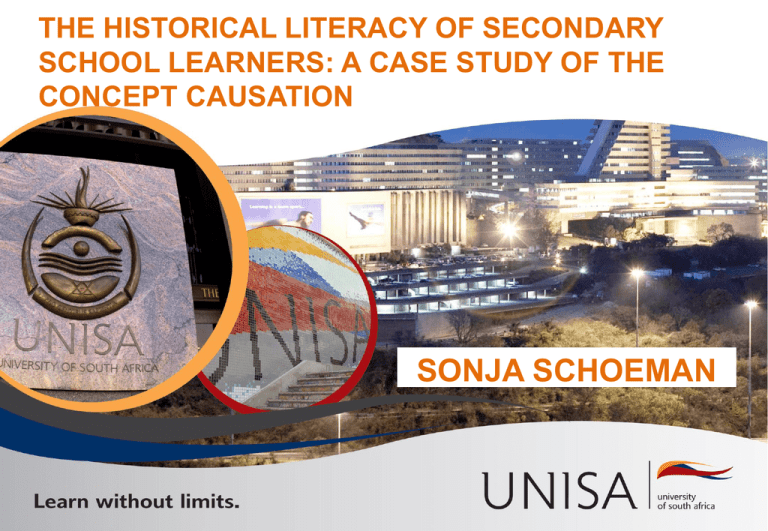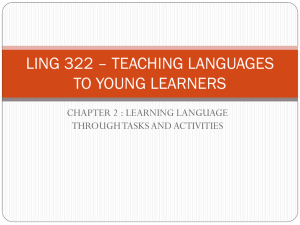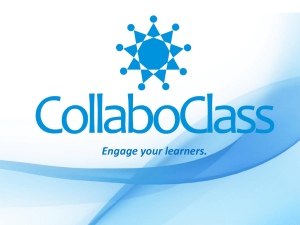18) The Historical Literacy of secondary school teachers
advertisement

THE HISTORICAL LITERACY OF SECONDARY SCHOOL LEARNERS: A CASE STUDY OF THE CONCEPT CAUSATION SONJA SCHOEMAN 1 INTRODUCTION • Re-framing debate about purpose, place and methodology of History education – term historical literacy useful concept • Historical literacy is not purposeless knowing of facts about past, but personal, social and political empowerment of learners • One key element of learners’ historical literacy is understanding of historical concepts such as causation 2 PROBLEM STATEMENT Learners find explanation of causes of historical events very difficult Development of learners’ ability to think about causes of historical events: only partly product of physical development effected by learning experiences, inside and outside school For many years, causes and effects of historical events were offered to learners in South African schools as recipes and not as something to think about Although learners could grasp the idea that a historical cause was something with the power to make something else happen, they often could not identify, articulate or understand the direct connection – the causal link – between cause and effect Inside school Outside school Portray causes of events as cut and dried and indisputable Adolescent learners’ demonstrated ability construct argument Teacher dictates or asks learners to copy “recognised” causes of certain events Persuade parents grant privileges/convince friends concede to their argument, “But ask those same kids to construct argument in history, and they can’t do it” Textbooks do not explain connections between cause and effect There have been critics of traditional approach since beginning of 20th Century Learners themselves generalising, analysing, judging and explaining Identifying challenges faced by learners seen as means by which teaching solutions can be identified 3 RESEARCH QUESTIONS • RQ1: What cognitive processes are involved in learners’ causal explanation of historical events? • RQ2: Which teaching strategies should be implemented to enhance the historical thinking of learners in terms of the concept causation? 3 PURPOSE OF STUDY • To contribute to an understanding of cognitive processes involved in learners’ causal explanation of historical events • To empower teachers to design lesson activities to develop learners’ understanding of key concept causation and enhance their historical thinking 4 CONCEPT CAUSAL EXPLANATION Causal explanation • of historical facts • taking into account occurrence of one or more prior events • that can be considered as “contributory causes” 4 EMPIRICAL STUDY Non-experimental research design involving quantitative data 4.1 Data-collection instrument • Group-administered questionnaire • Obtain data on cognitive processes involved when learners explain causes of historical event – Colonialism in Africa • Planning of questionnaire Peel and Hallam’s model and Carretero et al’s research findings Age and expertise tend to have influence on way learners explain causes of historical event Questionnaire Section 1 Section 2 Section 1: Age of respondents Determine if age plays role in explaining cause of historical event Age groups: 14 to 15 years old, 16 to 17 years old, 18 to 19 years old and 22 years and older Rationale for age groups: History abstract subject, cannot be understood at stage well below formal operational stage of 16.2 to 16.6 Formal operational stage/explanatory stage, learners able to make effective inferences from limited information and hypothesise in terms of motivation and causation Section 2: Expertise Determine expertise plays role in explaining causes of event Ordinal question: What caused colonialism in Africa? Obtain precise answer to question presented with six factors: intentional, ideological, economic scientific-technological, political and strategic Rank six factors according to significance of each in causation of historical event Ranking most important factor first, least important factor sixth • Rationale Colonialism in Africa knowledge focus area for research project – its presence as topic in History curricula of primary and secondary public schools, pre-1998 as well as post-1998 • All respondents some tacit knowledge of topic 4.2 Respondents • Systematic probability sampling technique • 50 respondents, five groups of ten Adolescent group • Three of five groups comprised adolescents of following age groups: 14 to 15 year-olds, 16 to 17 year-olds, 18 to 19 year-olds • Adolescent respondents came from public schools in Johannesburg West: D12 area • Adolescent respondents exposed to History during primary and/or secondary school careers Adult group Two groups of adults older than 22 years of age Enrolled for PGCE (SP and FET) at South African university Expertise (length and experience of history study) varied from informal or tacit knowledge to formal or extensive knowledge of historical event Adult respondents from all over Gauteng Adult group: non-history graduates One group – Life Orientation method students Psychology, biblical or religious studies as majors for their bachelor’s degree Exposed to History instruction primary/secondary school careers during Adult group: History graduates Second group History method students History as major for bachelor’s degree In-depth study of History 4.3 Data-collection procedure • Johannesburg West: D12 office to three adolescent groups • Researcher to two adult groups • Ethical considerations: anonymity and voluntary participation • 100% response 4.4 Data analysis • Descriptive statistical analysis using mean ranking scores • Rank causal factors on scale of 1 to 6 • High ranking of factor represented 1 • Low ranking of factor represented 6 • Mean score of 3.5 or higher interpreted as low ranking of a factor • Mean score of less than 3.5 high ranking of a factor 5 RESULTS Different groups of learners produced different historical explanations depending on their age, knowledge, experience of history Adolescent group Influence specific persons in historical event more important than structural factors Personalised understanding of history common Younger learners, concrete operational/descriptive stage of cognitive development Older learners, formal operational/explanatory stage of cognitive development Tacit knowledge, familiarity human action greater role in explanation than historical skill Adult group: non-history graduates Explanation testimony of formal operational/ explanatory stage of cognitive development Showed awareness structural factors of personal actions and Used tacit knowledge, familiarity with human action, meta-cognitive knowledge explain causes of historical event Adult group: History graduates Explanation testimony of formal operational/ explanatory stage of cognitive development Use extensive knowledge base of history explain causes of historical event Personal agents almost no influence, influential factors were structural factors most 6 CONCLUSION AND RECOMMENDATIONS • Causation – easiest and most difficult historical skill to teach • More demanding – if aim to engage learners with real historical thinking • Activities to teach concept of causation to engage learners in real historical thinking • Topics for causation lessons: Major events in history such as revolutionary change • Example: The French Revolution • Main objective of lesson: Enable learners to identify and classify reasons for French Revolution 6.1 Introductory phase • Introduce concept with cut-off-image starter activity • Print from English engraving published 1798 of execution of Louis XIV (1793) - but central scene blank • Start with event from end of story ˗ work back to explore why it took place • Learners see consequences of chain of events - help focus on what they will be asked to explain • Study the source - look for clues to speculate what is happening in picture • Use prior knowledge of event • Starter activity create problem to solve: Why was a king, who normally was the person who gave orders for someone to be executed, executed? • List of questions focus enquiry around causal reasoning: What were the causes of the revolution? What were the key events leading up to Storming of Bastille on 14 July 1789? How and why did the French Revolution happen? • Before analysis of causation can take place learners understand: narrative of French Revolution chronological factual base • Learners need not to know every event leading revolution, but appreciate how certain events lead to deterioration in relations between king and people of France 6.2 Middle phase • Card sort activity • Reread narrative, underline or highlight phrases relating to possible reasons • Write individual reasons for event on cards • Learners classify reasons and move cards to create patterns and orders • Success of activity based upon discussion of possible links • Identify social, economic, political and intellectual causes • Consolidate underlying reasons for revolution • Certain events (such as absolute power) classified under more than one category, solution learners place cards into Venn diagram 6.3 Concluding phase • Extended writing activity with categories as paragraphs • Learners in groups of six explain Venn diagram to class as a whole






